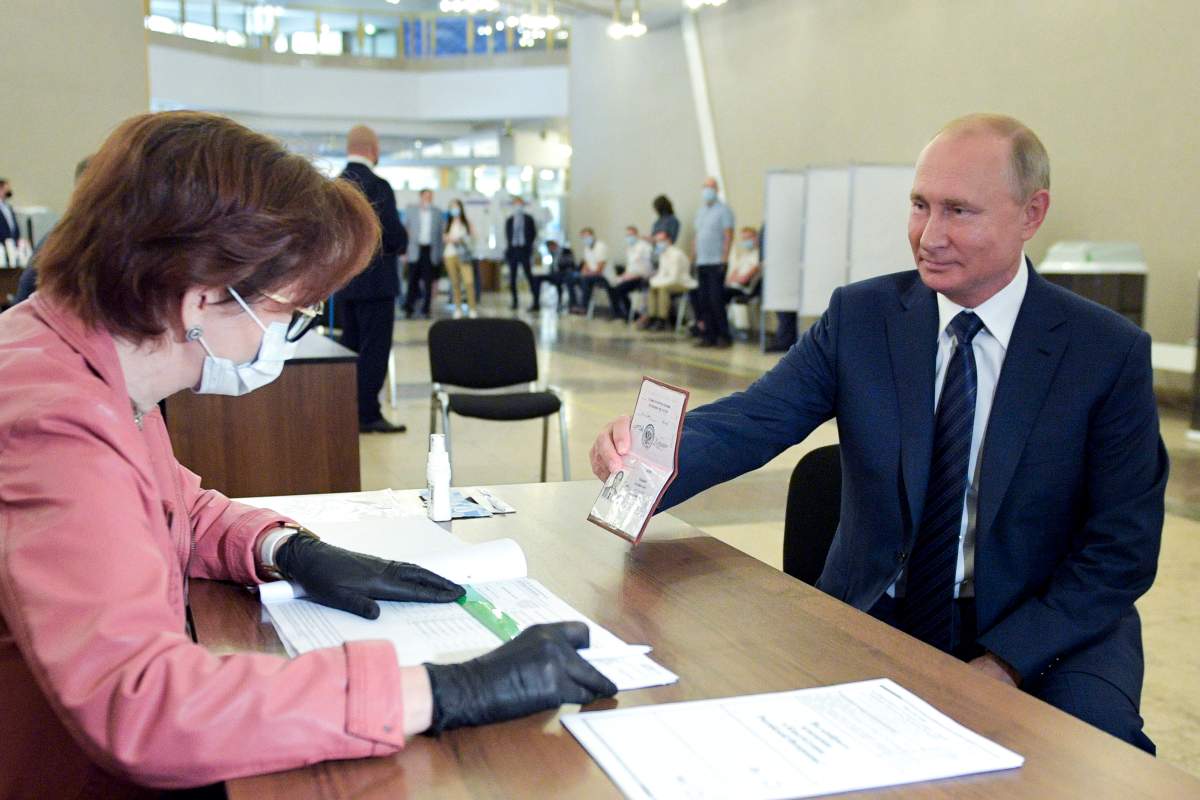Imagine if Jean Chrétien were still prime minister today — and the Canadian people had just voted to give him at least 16 more years in power.

That is the grand triumph that Vladimir Vladimirovich Putin achieved Wednesday in a national referendum that extended his right to serve as president through at least 2036. With almost all ballots having been counted by Thursday morning, the Russian strongman’s proposal — which could keep him in office until he is an octogenarian rather than only until 2024 — was ratified by more than three-quarters of voters after sailing through Russian parliament in March.
Putin loyalists in Russia — and there are tens of millions of them — say that whether all the previous elections he has won or this plebiscite have been fixed in his favour is of no great importance. He would have easily won them anyway.
That is true. Not one of Putin’s election landslides since 1999 was ever in doubt.
But such meddling when his potential political rivals have all been jailed, expelled or marginalized by the Russian courts and electoral system begs the question: why bother?

At a guess, the president likes the cover that this sham veneer of democracy provides because, as he sees it, it somehow legitimizes his rule. It may also comfort him knowing that Russians still love him, though his popularity has dipped in recent polls as Russia confronts the harsh reality that more than 650,000 of its people have been infected with the coronavirus and prices of oil and gas exports, which are the backbone of the economy, have plummeted.
To get the overwhelming victory that every self-respecting Russian dictator expects, it was felt best to hold the vote over seven days, rather than on one day, and to make Wednesday a national holiday. An added incentive for voters to cast their ballots was that those who did so got vouchers that they could use to shop at places such as supermarkets or toy stores.
Another trick was used, too. A vote against extending presidential term limits for Putin also meant automatically rejecting constitutional amendments on such motherhood issues as pension protections and remembering those Russians who were killed in the Second World War. Another of the many amendments attached to the ballot banned same-sex marriages, a prohibition that was strongly backed by Putin and the Russian Orthodox Church.

Get breaking National news
This is not the first time that Putin has gone through constitutional contortions to retain power. After the 67-year-old former KGB agent ran out of legal options to remain as president in 2008, he had his hapless sidekick and gopher Dmitri Medvedev run for president while he became prime minister for four years. The joke that every Russian got was that Medvedev was only a stand-in and that — nudge, nudge, wink, wink — the presidential powers that counted temporarily shifted to the prime minister’s office until Putin could run again.
WATCH (April 1, 2020): Putin calls for partial lockdown to help control the spread of COVID-19

The particular sleight of hand used this time was different. But the result was the same: Russia will get a lot more Putin.
Like the czars before him and Lenin, Stalin and Brezhnev, who presided over what was delightfully and accurately known as the Golden Age of Stagnation, Putin’s cherished dream is to apparently be carried out of the Kremlin in a coffin. Though, to be perfectly accurate, it must be said that whether it is July or January, the president conducts most business from the splendour of his dacha (cottage) in a well-treed coniferous forest on the outskirts of Moscow. Or, at times during the winter, from his second home in a luxurious fortress situated among palm trees on the Black Sea that Russians sometimes call “Putin’s Palace.”
What his countrymen don’t yet know is whether, upon his death, Putin wishes to be embalmed and entombed beside Lenin’s wax-like corpse in a ghoulish granite, open-to-public view in Red Square.
Wherever Putin ends up when he dies, he no longer cuts the same swashbuckling figure that he did a few years ago. There have been far fewer action photos lately of the president shirtless on horseback, flying a fighter jet, throwing judokas to the mat, stickhandling past Russian hockey greats or hunting for Siberian tigers.
WATCH (March 24, 2020): Putin wears hazmat suit at hospital, Moscow says coronavirus outbreak is worse than it looks

Putin has mostly hidden from public view throughout the COVID-19 crisis as the infection rate in Russia has soared and the economic fallout has worsened. Regional and municipal politicians have been left to do the heavy lifting. If required, they — not Putin — will inevitably shoulder the blame.
Internationally, Putin faces a significant new problem with the United States. Republican and Democrat politicians in Washington have been furious over damning revelations that Russian military intelligence placed a bounty on the heads of U.S. troops in Afghanistan, paying the Taliban for every American they murdered. Who knows what form retribution may take, but there will be payback.
Perhaps worst of all, polls in the U.S. show that Putin’s friend and sometime ally Donald Trump’s re-election bid this November is in serious jeopardy. Without Trump giving him a free pass, Putin may finally get much stronger pushback from the U.S. for seizing Crimea from Ukraine, fomenting a brutal civil war in eastern Ukraine, having closer ties to Iran and interfering in the last U.S. presidential election.
With so many woes and an emerging global landscape where Russia is now a distant third and falling in the superpower table behind the U.S. and China, Putin’s next 16 years as dictator may be far more problematic than his first 21 years. He should be more careful what he wishes for.
Matthew Fisher is an international affairs columnist and foreign correspondent who has worked abroad for 35 years. You can follow him on Twitter at @mfisheroverseas.







Comments